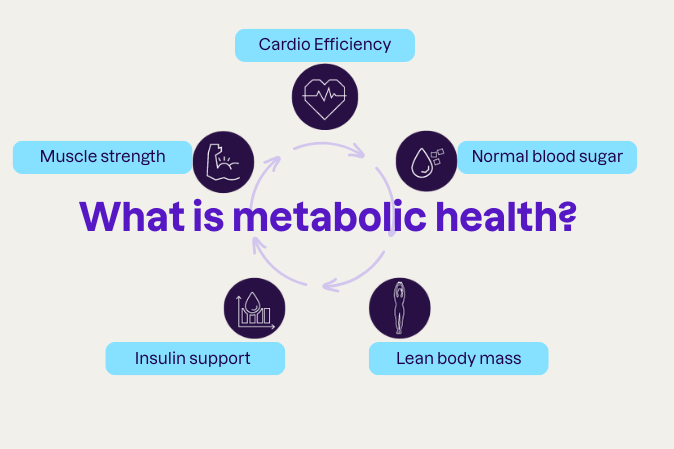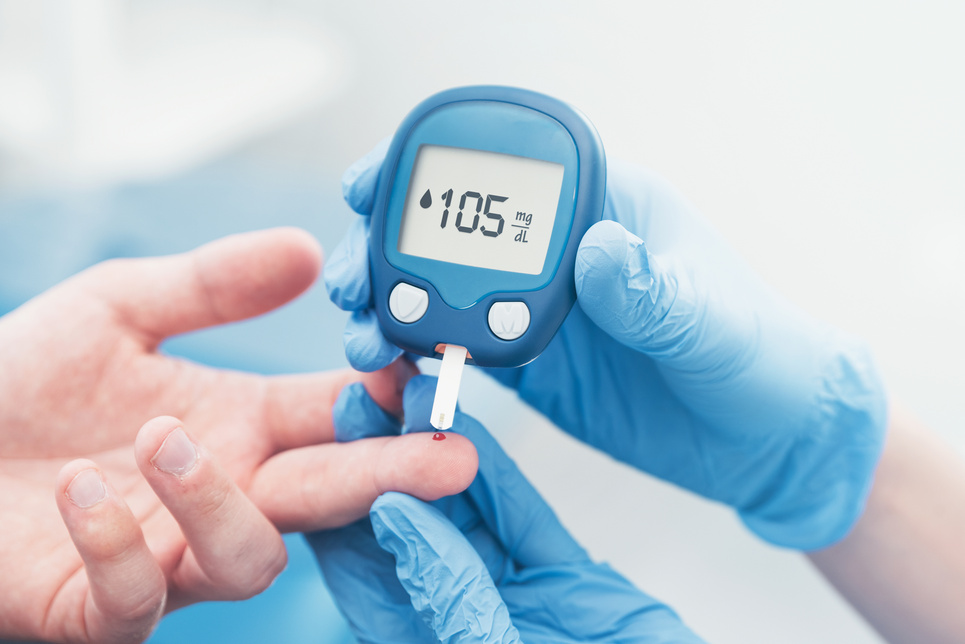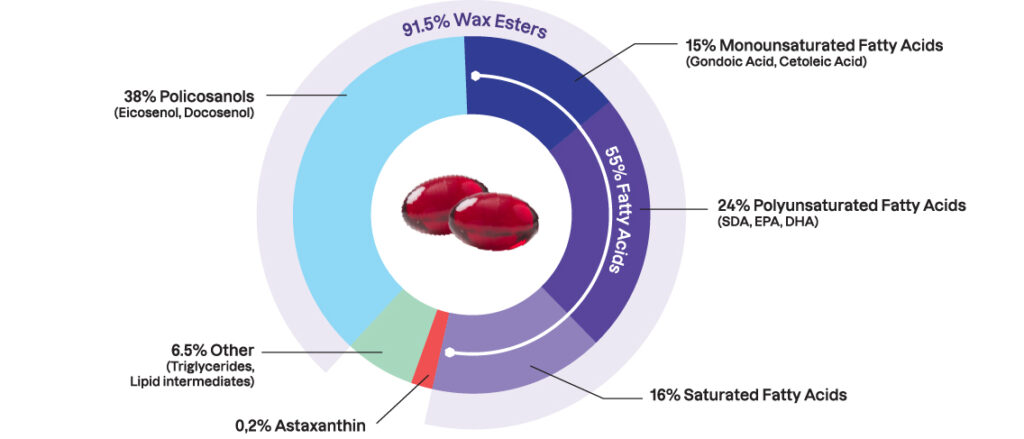
What is metabolic health?
Features with metabolic health
Awareness of the importance of metabolic health as we age has been growing steadily. Metabolic health refers to how well your body converts food into energy and how efficiently nutrients are used. Because metabolism reflects the body's ability to break down and utilize different fuel sources (sugar, protein, and fat), it also plays a role in maintaining healthy blood glucose, blood pressure, and blood lipids. Staying metabolically healthy means keeping these key markers of health within a healthy target range. People with good metabolic health have lower risk of blood sugar irregularity, deteriorating heart health, and chronic disease.

Causes of Poor Metabolic Health
Multiple factors that influence metabolic health, often act together. The most common are age, overweight/obesity, diets high in processed foods, saturated fats and refined carbohydrates, low physical activity or sedentary lifestyle, and genetic predisposition.
Insulin Resistance
A key factor in metabolic health is how the body responds to insulin. Insulin is produced in the pancreas and helps move sugar from the blood into cells to be metabolized. When this process is not working well, cells become resistant and respond poorly, which means the pancreas must work harder to produce more insulin. As a consequence, blood sugar rises. This process of insulin resistance occurs over a period of time and can sometimes be reversed in the early stages with nutrition and lifestyle changes.

Metabolic Syndrome
Having metabolic syndrome can increase the risk of type 2 diabetes and cardiovascular disease. Good metabolic health means that these risk factors stay within a healthy range during the process of aging.
Insulin resistance, metabolic syndrome, and prediabetes are closely related and often overlap.
When flexibility is lost
In metabolically healthy people, skeletal muscle normally switches between fat and glucose metabolism depending on whether someone is in a fasting, fed, or in an active stage. This is what is known as metabolic flexibility. After a high-fat low carbohydrate meal, ‘flexible’ muscle increases fatty-acid beta oxidation (fat metabolism) and reduces glucose utilization in the body as a primary energy source [1,2,3].
In obese and insulin resistant people, this switching is blunted therefore they have metabolic inflexibility, and fat metabolism doesn’t occur as it should after fatty meals [2]. The good news is that implementing lifestyle changes such as regular exercise, can help restore metabolic flexibility by improving mitochondrial capacity and fuel selection, as well as help restore insulin sensitivity [4,5, 6] (Gollnick et al 1973; Gollnick et al 1982; Saltin and Gollnick 2011.
In metabolically healthy people, skeletal muscle normally switches between fat and glucose metabolism depending on whether someone is fasting, eating, or exercising. This is called metabolic flexibility. After a high-fat, low-carbohydrate meal, flexible muscle increases fatty-acid oxidation (fat burning) and reduces glucose utilization [1,2].
Monitoring markers
Because insulin resistance is linked to a number of changes in your body, monitoring key markers may be useful. Improving insulin sensitivity typically improves the overall metabolic score (see Box 1). Common markers to follow over time include fasting glucose, hemoglobin A1c (HbA1c), triglycerides, cholesterol, waist circumference (or waist-to-height ratio), and blood pressure. Having three or more markers outside of the healthy range is likely to be consistent with metabolic syndrome (MetS).
Markers for metabolic health
TyG-WHtR
Xu et al (2025) has shown that TyG-WHtR is an efficient and reliable marker to identify the degree of Insulin Resistance and related health risks. TyG-WHtR stands for «triglyceride glucose-waist-to-height ratio». It is a novel index which combine triglyceride -glucose (TyG) index and waist-to-height-ratio (WHtR) to give an accurate measure of the Insulin Resistance and related conditions. The index is calculated by multiplying TyG-index (which uses fasting triglyceride and glucose levels) with WHtR (which uses waist and height).
Metabolic syndrome (MetS)
Yoon et al. (2021) describe this as a collection of risk factors which increases the chance for cardiovascular diseases, stroke and type 2 diabetes.
At least three of the following conditions: elevated blood pressure, elevated blood sugar, abdominal fat, low levels of HDL.
MetS is responsive over 2-3 months of time and is thus an aid to monitor personalized health.
Making lifestyle changes is the best way to tackle all areas of metabolic health.
Making dietary changes to include eating less processed food and reducing intake of sugar and saturated fats should be something that everyone aims for. Metabolic health is not only about weight management but also balancing healthy blood sugar levels and cardiovascular health as well. In the absence of a weight issue, an individual may still have a metabolism issue. The best solution is to ensure intake of a variety of healthy nutrients in the diet, and to make sure you engage in regular exercise!
Supporting metabolic health with Zooca® Calanus® Oil
Some dietary supplements can help support healthy metabolism and insulin sensitivity. A recently published 12-week clinical study in prediabetic subjects, with an average BMI of 34, showed improvement in insulin sensitivity by taking 2 g Zooca Calanus® Oil with a mild lifestyle change including an increase in exercise [10].
Lifestyle change remains the cornerstone, but some dietary supplements show potential to complement these efforts. Zooca Calanus® Oil is a marine oil rich in omega-3 fatty acids, wax esters, astaxanthin, and marine policosanols. Recent randomized controlled trials suggest that Zooca Calanus® Oil may help improve insulin sensitivity in people with obesity and prediabetes.
A 12-week study in 266 insulin-resistant adults [10] found that 2 g/day Zooca Calanus® Oil combined with lifestyle intervention significantly improved glucose homeostasis compared to placebo. Additionally, 4 g/day Zooca Calanus® Oil provided benefits in subjects with mild insulin resistance even without lifestyle support.
These findings strengthen earlier results from intervention studies combining Zooca Calanus® Oil with moderate exercise, which showed reductions in abdominal fat, improvements in lean body mass, and enhanced metabolic flexibility. Improved fat oxidation and insulin sensitivity are central to these outcomes, and together they support better glucose regulation, body composition, and long-term metabolic health. While further long-term research is needed, the accumulating evidence positions Zooca Calanus® Oil as a promising adjunct to lifestyle strategies for maintaining metabolic health.

References
- Kelly DE, Mandarino LJ. Diabetes. 2000;49:677–683. doi: 10.2337/diabetes.49.5.677
- Kelly, D.E., Goodpaster, B. Wing R.R., Simoneau, J-A. 2022. Am. J. Physiol. 277 (Endocrinol. Metab. 40). http://www.ajpendo.org
- Smith, R.L., Soeters, M.R., Wüst. R. C.I., Houtkooper, R.H. 2018. Endocrine Reviews 39: 489 – 517. doi: 10.1210/er.2017-002114 Gollnick PD, Armstrong RB, Sembrowich WL, et al. J Appl Physiol. 1973;34:107–111. doi: 10.1152/jappl.1973.34.1.107
- Gollnick PD, Armstrong RB, Sembrowich WL, et al. J Appl Physiol. 1973;34:107–111. doi: 10.1152/jappl.1973.34.1.107
- Gollnick, P.D. and Saltin, B. 1982, Clinical Physiology, 2: 1-12. doi.org/10.1111/j.1475-097X.1982.
- Saltin, B. And Gollnick, P.D. Comprehensive Physiology. 2011 doi:10.1002/cphy.cp100119
- Goodpaster BH, Sparks LM. Cell Metab. 2017;25:1027–1036. doi: 10.1016/j.cmet.2017.04.015
- Dou, J-h. Guo, F.-s. Guo, C., Wu, R-Y, Hu Y-W. Sun, X-L, Wei, J. 2025. Diabetes Research and Clinical Practice,227, doi.org/10.1016/j.diabres.2025.112398
- Yoon, J. Jung, D, Lee, Y., Park, B. J. Pers. Med. 2021, 11(8), 742; doi.org/10.3390/jpm11080742
- Kerlikowsky, F. Bartsch, M. Jonas, W., Andreas Hahn, A., Schuchardt, P. 2025, Marine Drugs. 23, 139. doi.org/10.3390/md23040139

